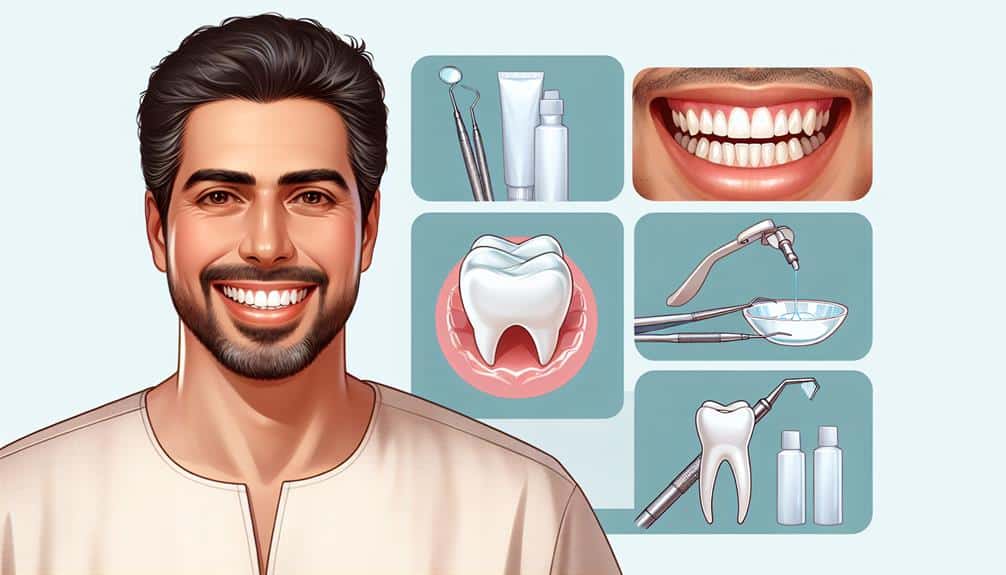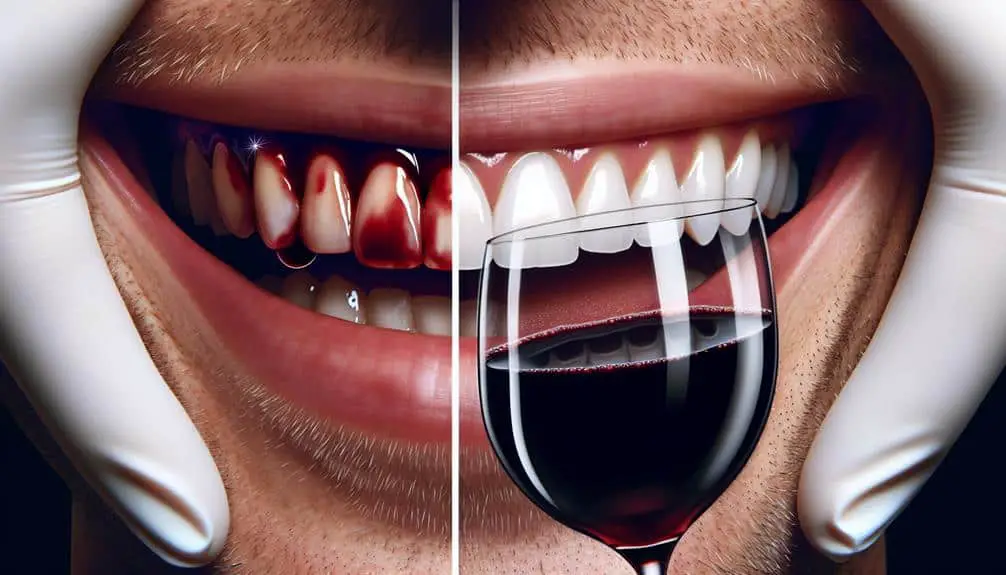If you're looking to tackle coffee stains on your teeth effectively, professional dental whitening treatments offer proven solutions. Laser therapy and bleaching trays are common methods that provide long-lasting results by accelerating the bleaching process and ensuring even distribution of whitening agents. At-home whitening kits with whitening strips and peroxide gels offer convenient options, breaking down stains with peroxide and bleaching tooth enamel. Natural remedies like oil pulling and turmeric paste can also help, but caution is advised to protect enamel. Consider consulting a dental professional before trying any treatment for best results.
Key Points
- Professional dental whitening treatments like laser therapy and bleaching trays provide effective and long-lasting results.
- At-home whitening kits with whitening strips and peroxide gels offer convenient solutions for coffee stains.
- Natural remedies such as oil pulling and baking soda can help remove coffee stains gently.
- Whitening toothpaste and mouthwash are valuable additions to daily oral care to combat coffee stains.
- Consistent oral hygiene and regular cleanings by a dental professional are crucial for maintaining whitening results and preventing new stains.
Professional Dental Whitening Treatments
When seeking a solution for coffee-stained teeth, professional dental whitening treatments offer effective and long-lasting results.
Two common methods used in professional whitening treatments are laser therapy and bleaching trays. Laser therapy, a popular choice in dental offices, involves the use of a laser to accelerate the bleaching process. The laser activates the bleaching agent on your teeth, resulting in a quicker and more efficient whitening treatment. This method is often preferred for its precision and ability to target specific areas of discoloration.
On the other hand, bleaching trays are custom-made trays that you wear over your teeth and fill with a bleaching solution. These trays are designed to fit your teeth perfectly, ensuring even distribution of the whitening agent. While this method may take longer to show results compared to laser therapy, it's a cost-effective and convenient option that you can use in the comfort of your home.
Professional dental whitening treatments, whether through laser therapy or bleaching trays, can effectively address coffee stains and provide you with a brighter, whiter smile.
At-Home Whitening Kits
For individuals looking to address coffee-stained teeth in the comfort of their own homes, at-home whitening kits provide a convenient and accessible solution. These kits often include whitening strips and peroxide gels, both of which are commonly used for teeth whitening. Whitening strips are thin, flexible plastic strips coated with a whitening gel containing peroxide. When applied to the teeth, the gel works to break down stains and lighten the teeth. Research suggests that whitening strips can be effective in improving the color of teeth stained by coffee.
Peroxide gels, another common component of at-home whitening kits, work by penetrating the tooth enamel to bleach stains. Safety is a key consideration when using peroxide gels at home. It's essential to follow the instructions provided with the kit carefully to avoid potential side effects such as tooth sensitivity or gum irritation. While at-home whitening kits can be effective, it's advisable to consult with a dental professional before use, especially for individuals with existing dental issues or concerns.
Natural Remedies and DIY Options
Consider exploring natural remedies and DIY options as alternative approaches to addressing coffee-stained teeth. Oil pulling, a traditional Indian remedy, involves swishing oil (like coconut or sesame) in your mouth to remove toxins, bacteria, and stains. Baking soda, known for its mild abrasive properties, can gently scrub away surface stains when used in toothpaste or mixed with water to form a paste for brushing.
Turmeric paste, a mixture of turmeric powder and water, is believed to have natural whitening properties due to its anti-inflammatory and antimicrobial qualities. Activated charcoal, despite its black color, can help remove stains by binding to compounds that cause discoloration on the teeth.
While these natural remedies and DIY options may show some effectiveness in reducing coffee stains, caution is advised and not too frequently to avoid damaging the enamel. Remember to consult with a dentist before trying any new treatment to make sure it's safe for your teeth and gums.
Whitening Toothpaste and Mouthwash
Explore the potential benefits of incorporating whitening toothpaste and mouthwash into your oral care routine to address coffee-stained teeth effectively. When it comes to combating coffee stains, these products can be valuable additions to your daily regimen. Here are some key points to keep in mind:
- Diet Impact: While whitening toothpaste and mouthwash can help reduce surface stains from coffee, it's important to remember that maintaining a balanced diet is key. Limiting the consumption of coffee and other pigmented foods and beverages can help prevent new stains from forming.
- Sensitivity Concerns: Some whitening toothpaste and mouthwash products may contain ingredients that could potentially increase tooth sensitivity. Be mindful of this and opt for products specifically formulated for sensitive teeth if you experience any discomfort.
- Consistency is Key: For the best results, consistency in using whitening toothpaste and mouthwash as directed is crucial. Make sure to incorporate them into your daily oral care routine for the greatest chance at effectively combating coffee stains.
- Consult Your Dentist: If you have any concerns about using whitening toothpaste and mouthwash, it's always a good idea to consult your dentist for personalized recommendations and advice tailored to your oral health needs.
Maintaining Results and Preventing Stains
To maintain the results of your whitening efforts and prevent new stains from forming, consistency in your oral care routine is vital. Regular cleanings by a dental professional are essential for keeping your teeth free from plaque and tartar buildup that can lead to discoloration. These cleanings not only help in maintaining the whiteness of your teeth but also contribute to overall oral health.
In addition to regular cleanings, enamel protection is key to preventing stains. Enamel is the outermost layer of the teeth and acts as a protective barrier. To maintain enamel health, avoid acidic foods and beverages that can erode the enamel and make it more susceptible to staining. Using fluoride toothpaste and mouthwash can also help strengthen enamel and protect against stains.
Consistent oral hygiene practices such as brushing twice a day, flossing daily, and using whitening products as recommended can further aid in maintaining the results of your whitening treatments. By incorporating these habits into your daily routine, you can help safeguard your teeth against stains and preserve a bright, white smile.
Frequently Asked Questions
Can Coffee Stained Teeth Be Permanently Whitened or Will the Stains Come Back Over Time?
Achieving permanent whitening for coffee-stained teeth is elusive. Despite initial success, stains can recur over time. To maintain longevity, focus on stain prevention through regular dental cleanings and mindful consumption of coffee. Consistent care is key.
Are There Any Long-Term Side Effects or Risks Associated With Professional Dental Whitening Treatments for Coffee Stained Teeth?
When contemplating professional dental whitening for coffee stained teeth, it is crucial to weigh the long-term effectiveness against potential risks. Professional treatments offer more lasting results compared to at-home methods but may entail risks like increased tooth sensitivity.
How Quickly Can I Expect to See Results From Using At-Home Whitening Kits on Coffee Stained Teeth?
You can typically expect to see results from at-home whitening kits for coffee stained teeth within a few weeks. Consistent use is key for maintenance. Before/after comparisons can show effectiveness. Follow instructions carefully for best outcomes.
Are There Any Specific Foods or Drinks I Should Avoid to Prevent Further Staining After Whitening My Coffee Stained Teeth?
Prolong the pearly glow post-whitening by making mindful mouth choices. Lifestyle shifts and dietary decisions can deter discoloration. Embrace enamel-friendly fare, evade staining sips. Preserve that pristine smile with prudent prevention practices.
Is It Possible to Over-Whiten Teeth and Damage the Enamel When Using Whitening Toothpaste and Mouthwash for Coffee Stained Teeth?
To avoid enamel damage, prevent sensitivity, and guarantee top whitening results, use whitening toothpaste and mouthwash safely. Follow recommended usage guidelines, and consult your dentist for personalized advice on maintaining enamel protection while effectively treating coffee-stained teeth.



